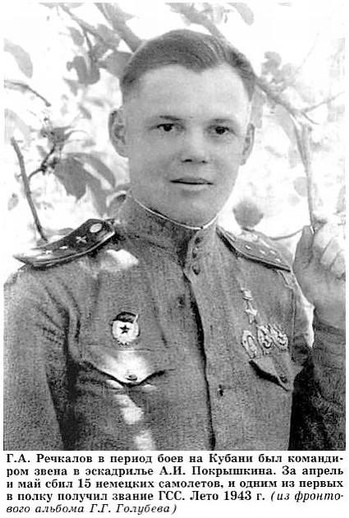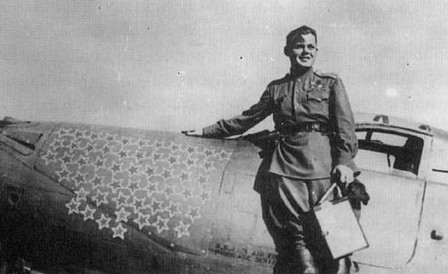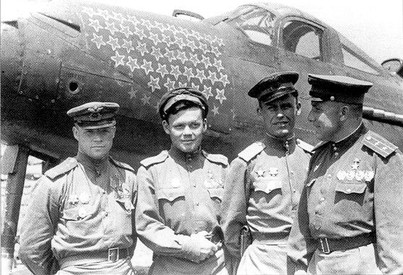Il pilota Gregory Rechkalov - Myouth - Ricordi degli anni '70
Menu principale:
Il pilota Gregory Rechkalov
Modellismo > Aerei > Bell P-39N Airacobra
Il pilota, Grigory Andreevich Rechkalov
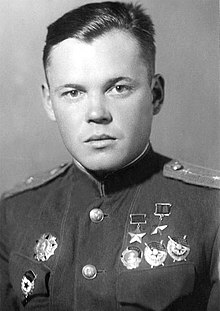
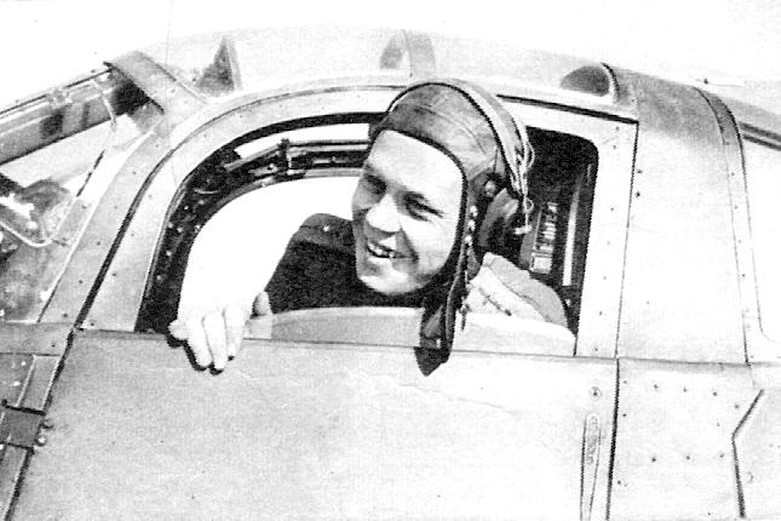
Due volte Eroe dell'Unione Sovietica, G. A. Rechkalov nella cabina del suo "Aero Cobra"
Twice Hero of the Soviet Union G. A. Rechkalov in the cockpit of his "Aero Cobra".
Fonte: Lovesushi
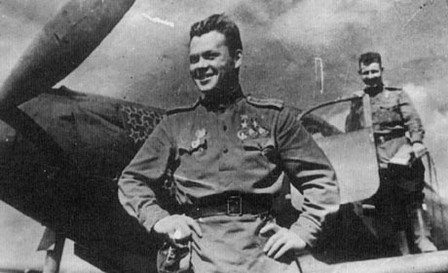
Rechkalov in front of his Bell P-39Q-15 Airacobra. The pilot on the wing is Boris Glinka.
Credit: Surfcity
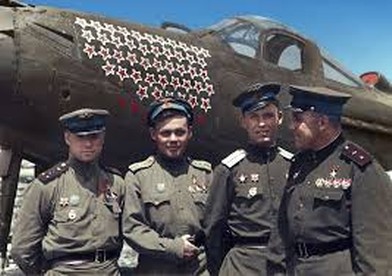
A. Clubs, G. Rechkalov, A. Labor and B. Glinka (from left to right).
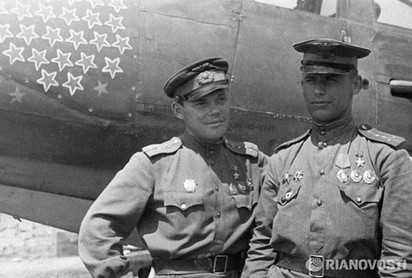
Il 1 luglio 1944 è stata riconosciuta a Rechkalov la seconda medaglio di Eroe dell'Unione Sovietica per i suoi 48 abbattimenti personali e 6 condivisi
Rechkalov is awarded with the second HSU on July 1st, 1944 for 48 personal and 6 shared victories.
Credit: Altervista
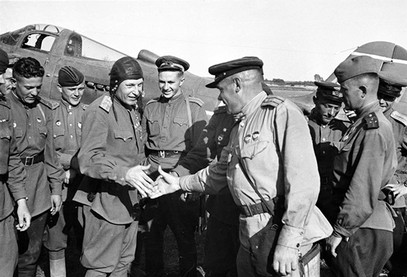
Il 1 luglio 1944 è stata riconosciuta a Rechkalov la seconda medaglio di Eroe dell'Unione Sovietica per i suoi 48 abbattimenti personali e 6 condivisi
Rechkalov is awarded with the second HSU on July 1st, 1944 for 48 personal and 6 shared victories.
Credit: Altervista
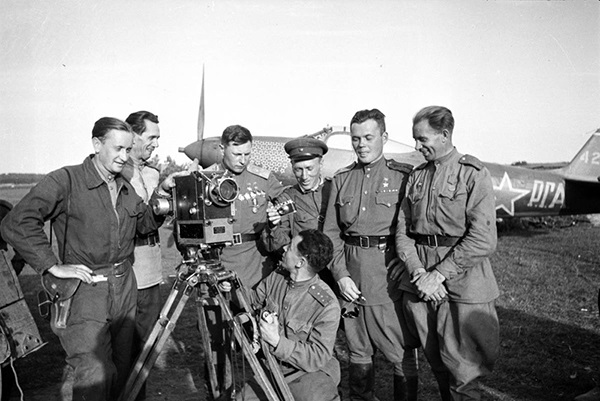
Il 1 luglio 1944 è stata riconosciuta a Rechkalov la seconda medaglio di Eroe dell'Unione Sovietica per i suoi 48 abbattimenti personali e 6 condivisi
Rechkalov is awarded with the second HSU on July 1st, 1944 for 48 personal and 6 shared victories.
Credit: Altervista
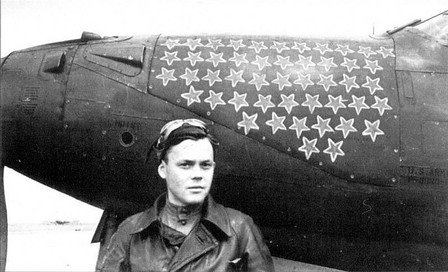
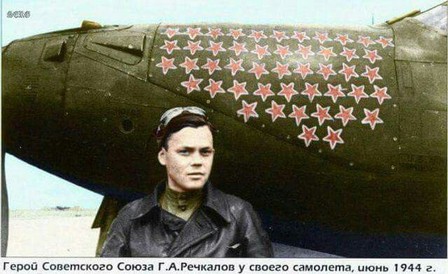
Grigory Rechkalov (in Russo Григо́рий Андре́евич Речка́лов) è nato il 9 febbraio 1920 nel villaggio di Khudyakovo, nella regione di Vladimir. E' cresciuto in una normale famiglia di contadini. Dopo essersi diplomato in sei gradi della scuola, ottenne un lavoro come elettricista presso lo stabilimento metallurgico di Verkh-Isetsky. Allo stesso tempo, il giovane ha studiato in un club di volo locale.
Ha prestato servizio nell'Armata Rossa dal gennaio 1938. Un anno dopo, si è laureato alla scuola pilota di aviazione militare di Perm. Ha prestato servizio come pilota junior nel 55 ° reggimento di aviazione dell'aeronautica militare del distretto militare di Odessa.
Nel giugno del 1941 venne inviato al fronte nella seconda guerra mondiale. Era il comandante del sedicesimo reggimento delle guardie dell'aviazione da combattimento (16° GIAP) , della 216a divisione dell'aviazione mista e della 4a armata aerea.
Nel maggio del 1943, il l'ormai tenente anziano Rechkalov fece 194 missioni in 54 battaglie aeree, abbattendo personalmente 12 aerei nemici. Durante una delle battaglie aeree, è stato gravemente ferito alla testa e alla gamba e per lungo tempo è stato ricoverato in ospedale.
Con un decreto del Presidium del Soviet supremo dell'URSS del 24 maggio 1943, per il coraggio e l'eroismo mostrati nelle battaglie, il tenente Grigory Andreyevich ricevette il titolo di Eroe dell'Unione Sovietica con il premio dell'Ordine di Lenin e la medaglia della Stella d'oro.
Dopo la convalescenza tornò nuovamente in servizio e nel giugno 1944 fece 415 missioni, partecipò a 112 battaglie aeree, abbattendo personalmente 48 aerei nemici e 6 in collaborazione con il gruppo.
Con un decreto del Presidium del Soviet Supremo dell'URSS del 1 ° luglio 1944, il Capitano Rechkalov Grigory Andreevich ricevette la seconda medaglia della Stella d'oro per i nuovi successi militari ottenuti.
Da luglio 1944 a marzo 1945 fu comandante del 16° GIAP. Nel marzo del 1945, divenne un istruttore di volo nel 9 GIAD.
Grigory Andreevich ha combattuto sui fronti sud, nord del Caucaso, 1, 2 e 4 ucraini. Ha partecipato a battaglie difensive nell'Ucraina meridionale, alla difesa del Caucaso settentrionale, alla liberazione di Kuban, Donbass, Crimea, Bielorussia e Polonia, nell'operazione di Berlino. In totale, durante la guerra, Rechkalov fece oltre 450 sortite sui caccia I-153 Chaika, I-16, Yak-1 e P-39 Airocobra; partecipò a 122 battaglie aeree, in cui 61 aerei nemici furono abbattuti personalmente.
Dopo la guerra, Rechkalov continuò a prestare servizio nell'Aeronautica. Dall'agosto del 1945, divenne un pilota ispettore nella tecnica di pilotaggio del 6th Guards Fighter Aviation Corps. Nel 1951 si laureò all'Accademia aeronautica.
Dal 1951, era il vice comandante; dal luglio 1952, il comandante della 10a divisione dell'aviazione delle guardie di caccia. Ha quindi comandato la 146a divisione aerea da combattimento del corpo di difesa aerea di Sakhalin. Dal 1957, è stato nominato vice comandante degli aerei da combattimento dell'Esercito di difesa aerea dell'Estremo-Oriente separato.
Dall'aprile 1959, con il grado di Maggiore Generale dell'Aviazione, Grigory Rechkalov fu trasferito nella riserva. Ha vissuto nelle città di Novosibirsk, a Mosca. Negli ultimi anni della sua vita, era nella città di Zhukovsky, nella regione di Mosca.
Grigory Rechkalov, un pilota militare, morì il 20 dicembre 1990. Fu sepolto nel villaggio di Bobrovsky, nella regione di Sverdlovsk.
Medaglie e onoreficenze
- Due volte Eroe dell'Unione Sovietica (24.05.1943, 01.07.1944);
- Ordine di Lenin;
- Quattro ordini dello stendardo rosso;
- Ordine di Alexander Nevsky (2 ottobre 1943);
- Ordine della guerra patriottica di 1 ° grado;
- Due ordini della stella rossa (26 ottobre 1955; 1956);
- Medaglia "Per merito militare" (24 giugno 1948);
- Medaglia "Per la vittoria sulla Germania nella Grande Guerra Patriottica del 1941-1945.";
- Medaglia per l'anniversario "Venti anni di vittoria nella grande guerra patriottica del 1941-1945";
- Medaglia per l'anniversario "Trent'anni di vittoria nella grande guerra patriottica del 1941-1945";
- Medaglia per l'anniversario "Quarant'anni di vittoria nella grande guerra patriottica del 1941-1945";
- Cittadino onorario di Balti.
Fonte/Credits: Wikipedia
Grigory Andreevich Rechkalov (Russian: Григо́рий Андре́евич Речка́лов; 9 February 1920 – 20 December 1990) was a Soviet fighter pilot during World War IIwho scored over fifty solo shootdowns, making him one of the highest scoring Soviet fighter pilots. He was twice awarded the title Hero of the Soviet Union for his aerial victories and went on to become a general after the war.
Early life
Rechkalov was born on 9 February 1920 in Khudyakovo into a Russian peasant family. After graduation from school, he joined the Army in 1938, and in 1939 graduated from Perm Military Aviation Pilot School. He was initially grounded because of Daltonism, but due to the start of the war he was allowed to fly in 1941 and posted to the 55th Fighter Aviation Regiment, stationed in the Odessa Military District.
World War II
He began his combat career on 22 June 1941 over Moldavia flying a I-153 marked "blue 13" on the tail, undertaking 30 sorties in this aircraft during the month and engaging in ten combats. On 27 June, Rechkalov attacked and brought down an Hs.126 east of Boksha, near Sculeni, for his first claim. On 11 July he claimed a Ju 88 near Kotovsk. On 26 July 1941 near Dubasari, Rechkalov was wounded in the right leg by anti-aircraft fire. He returned safely to his airfield and after landing was hospitalized. Due to the severity of the wound he had was forced to stay with a reverse aviation unit for several months after the three surgeries. He returned to his previous in Spring 1942. Earlier, the unit has been honored with the guards designation and renamed 16 Guards Fighter Aviation Regiment for outstanding service.
By the end of 1942, Rechkalov had claimed 4 and 2 shared victories. At that time, the 16th Regiment was re-equipped with new P-39 Airacobras and temporarily posted to the reserve for training. In the spring of 1943, they were posted to the North Caucasus Front and the Kuban River. On 24 May 1943, he was awarded the title Hero of the Soviet Union for 12 solo and 2 shared shootdowns throughout 194 sorties.
In May 1944 Rechkalov took command over the 16th Guards Fighter Aviation Regiment, but on 31 May 1944, while leading a formation over Iași, five P-39s were lost after he decided to pursue a group of Bf 109 fighters alone. According to official accounts, Rechkalov was disciplined by his superiors for pursuing the enemy alone rather than offering leadership to his less experienced squadron. Upon the recommendation of his commanding officer Aleksandr Pokryshkin, Rechkalov was replaced by Boris Glinka of the 100th Guards Fighter Aviation Regiment as commander of the 16th Guards Fighter Aviation Regiment for (according to Pokryshkin) "losing control, indecisiveness and lack of initiative". Throughout the war Pokryshkin clashed with Rechkalov over his lack of discipline.
On 15 July 1944, Glinka was seriously wounded when he bailed out of his badly damaged P-39 and struck the tailplane. Rechkalov again took over as regiment commander, but left command of it in February 1945 and was appointed Inspector for Flight Training of 9th Guards Fighter Aviation Division.
By the end of the war he had flown 452 sorties and engaged in 122 dogfights; operational documents credit him with 56 solo and 6 shared kills, while certification documents credit him with 61 solo and 4 shared. He flew the I-153, I-16, MiG-3, Yak-1, and P-39, but a vast majority of his tally was on the P-39. His award nomination did not mention his three victories from 1941, although there have been allegations that Pokryshkin tried to steal some of Rechkalov's kills.
Postwar
In 1951 he graduated from the Air Force Academy in Monino. He then commanded a regiment, and various air divisions. In 1957 he was deputy commander of the fighter aircraft separate Far Eastern Air Defense Army. Rechkalov went on to become a Major General of Aviation in the Soviet Air Force in 1957 before leaving the military in 1959. He wrote two books about his wartime experiences: Дымное небо войны (English: The Smoking Skies of War) and В Небе Молдавии (English: In Moldavian Skies). Rechkalov lived in Moscow until his death on 20 December 1990.
Awards and honors
- Twice Hero of the Soviet Union (24 May 1943 and 1 July 1944)
- Order of Lenin (24 May 1943)
- Four Order of the Red Banner (30 December 1942, 5 May 1943, 22 October 1944, and 14 August 1957)
- Order of Alexander Nevsky (2 October 1943)
- Two Order of the Red Star (26 October 1955 and 14 May 1956)
- campaign and jubilee medals
Fonte/Credits: Wikipedia
Lista degli abbattimenti di Grigorii Andreevich 'Grisha' Rechkalov
Kills by Grigorii Andreevich 'Grisha' Rechkalov
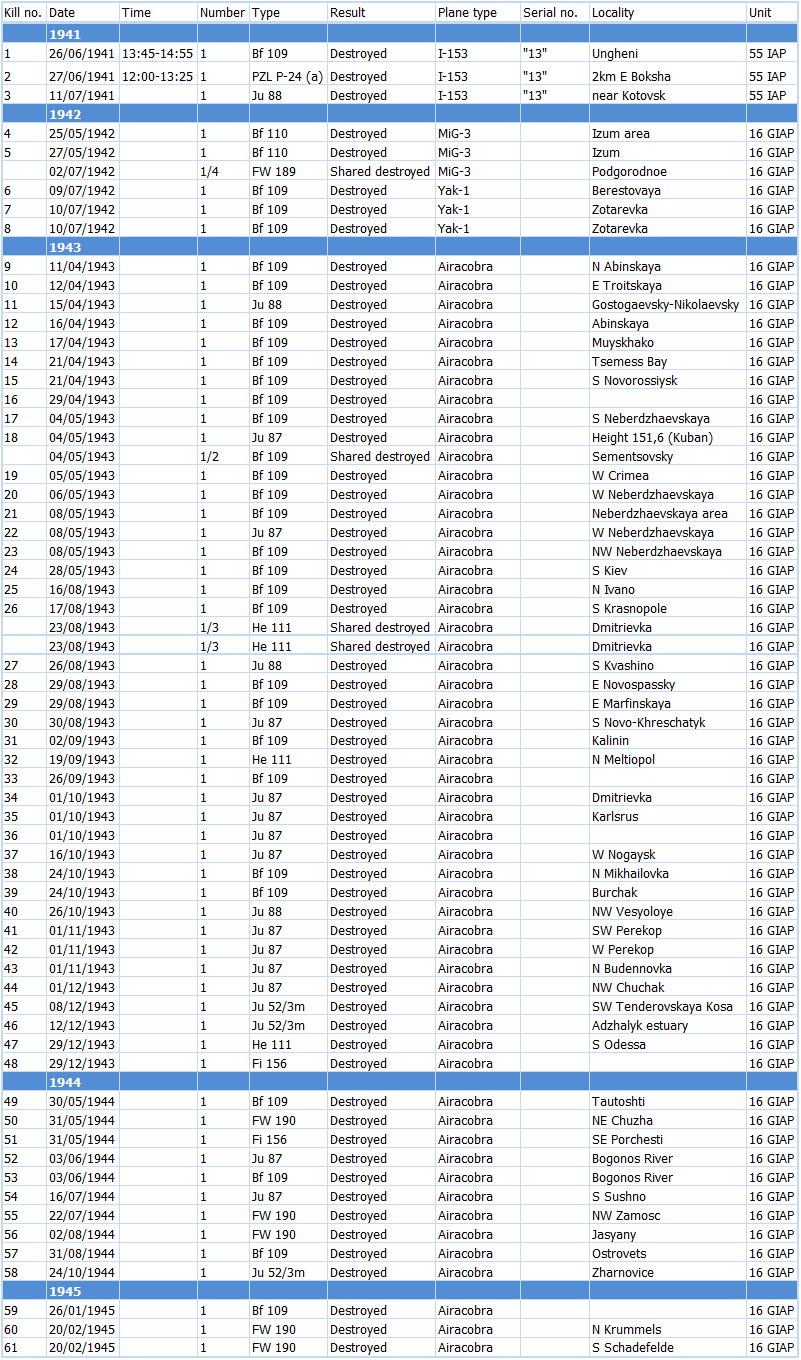
Ci sono molti siti che parlano di Grigorii Andreevich 'Grisha' Rechkalov. Ne elenco alcuni che ho usato per studiarne la storia
Many websites describe the life of Grigorii Andreevich 'Grisha' Rechkalov. Here's teh list of some of them:
Home Page | Modellismo | Topolini | Altri Disney | Linus | Asterix | Diabolik | Giornalini di guerra | Western | Riviste | Romanzi | Mappa generale del sito
